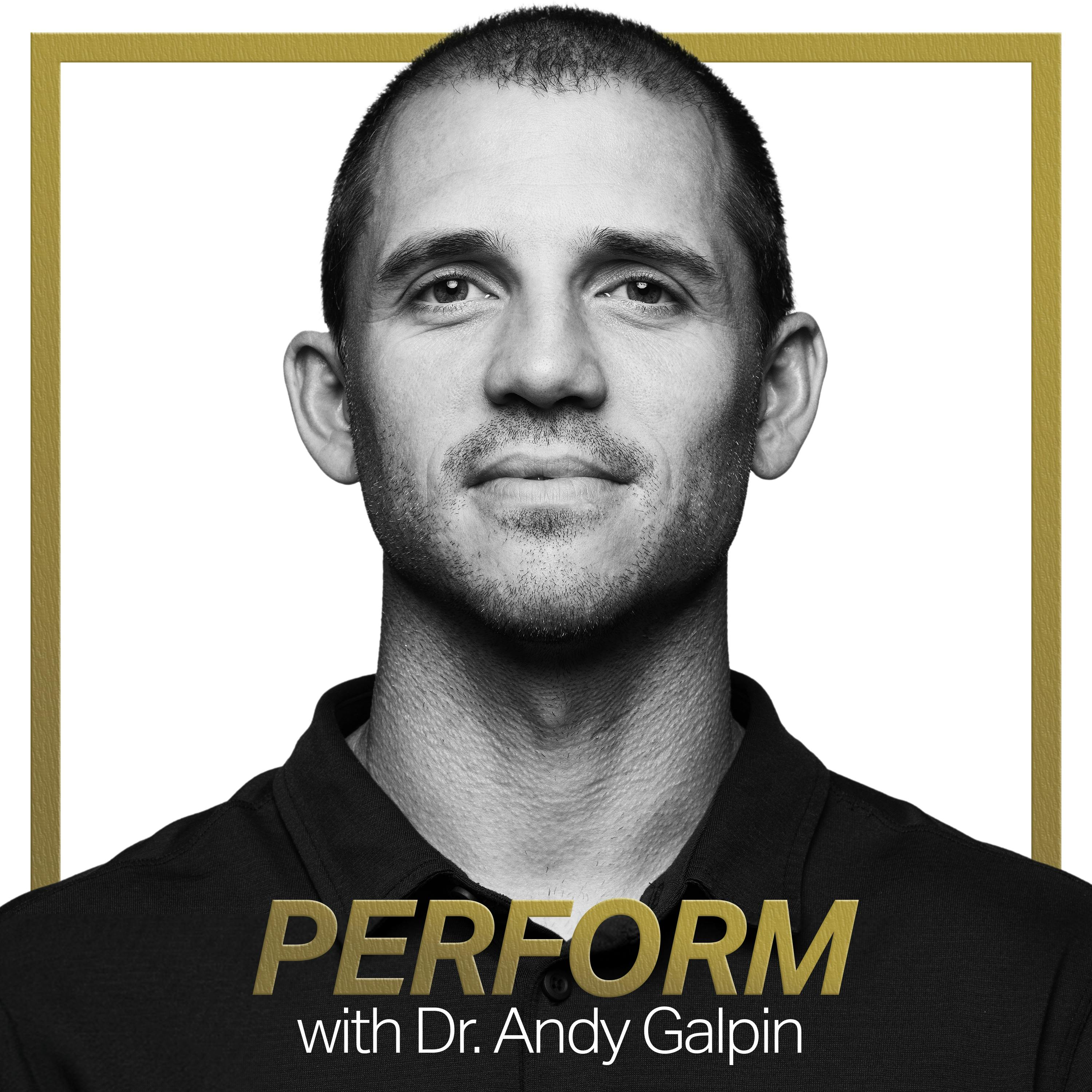
July 10, 2024 • 2hr 2min
How to Enhance Performance With Better Sleep
Perform with Dr. Andy Galpin

Key Takeaways
- Sleep optimization can provide a significant competitive advantage for athletes and high performers
- Improving sleep duration, quality, and timing can enhance speed, accuracy, reaction time, and competition performance
- Most athletes suffer from chronic suboptimal sleep despite needing more sleep than the average person
- Sleep extension of 30-90 minutes per night can improve athletic performance by 3-10% across various metrics
- 20-40% of athletes have undiagnosed sleep disorders that impair performance
- Simple interventions like sleep education and basic hygiene practices can significantly improve sleep duration and quality
- Optimizing sleep timing and circadian rhythms can provide a 1-6% performance advantage, even without changing sleep duration
- A structured sleep plan considering an athlete's unique physiology and sport demands is crucial for maximizing performance benefits
- Wearable sleep trackers can be helpful for accountability but should be used cautiously to avoid obsessing over arbitrary metrics
- Treating underlying sleep disorders, optimizing sleep environment, and addressing issues like snoring are key for improving sleep quality
Introduction
In this episode, Dr. Andy Galpin discusses how sleep optimization can produce a significant competitive advantage for athletes and high performers. He explains the science behind how sufficient, high-quality sleep enhances speed, accuracy, reaction time, and overall athletic performance.
Dr. Galpin focuses on the benefits of improving sleep for those already getting 6-7 hours per night, rather than discussing extreme sleep deprivation. He covers three main areas of sleep optimization: duration, quality, and timing.
The episode provides practical strategies for investigating, interpreting, and intervening to improve sleep, ranging from free protocols to high-precision clinical sleep testing. Listeners will understand how to create an effective sleep program tailored to individual needs and performance goals.
Topics Discussed
The Athlete Sleep Paradox (45:38)
Dr. Galpin explains the "athlete sleep paradox" - despite needing more sleep, athletes tend to sleep less and worse than non-athletes:
- Most athletes sleep 6.5-7 hours per night on average
- 40% of collegiate athletes report sleeping less than 7 hours on weeknights
- Over 50% report high daytime sleepiness
Reasons for poor sleep in athletes include:
- Early morning practices and late night competitions
- Larger body/neck size predisposing to sleep disorders
- Pre-competition anxiety
- Caloric restriction and excessive training in some sports
"Athletes tend to sleep worse. And there's a lot of reasons for this. Some of it's very practical. They have early morning practices. They have extensive late night games or competitions."
Why Athletes Need More Sleep (50:07)
Dr. Galpin explains the biochemistry behind why athletes likely need more sleep than average:
- Exercise increases ATP usage and breakdown into adenosine
- Adenosine accumulation in the brain increases sleep pressure/fatigue
- More physical activity may require more sleep to clear adenosine and restore ATP
"It would then make sense and we could intuit someone who's going through more ATP recycling and production throughout the day, like an athlete, like somebody who's more physically active, would need more sleep, more time for the lymphatic system to operate, more time to clear our overall adenosine."
Benefits of Sleep Extension (20:51)
Dr. Galpin reviews research on the performance benefits of sleep extension in athletes:
- Increasing sleep by 30-90 minutes per night can improve performance by 3-10%
- A seminal study on Stanford basketball players found:
- 9% improvement in free throw and 3-point shooting accuracy
- 0.7 second improvement on sprint test
- Improved subjective ratings of practices and games
- Similar benefits seen in studies on swimmers, tennis players, and endurance cyclists
"I don't know about you, but if you walked into any performance staff or coach's office or walked into an athlete's locker and said, I'm gonna get you a 10% improvement in all these metrics throughout the year, I think you're gonna catch their attention."
Practical Strategies for Sleep Extension (28:29)
Dr. Galpin provides practical tips for extending sleep duration:
- Use "sleep banking" before periods of known sleep loss (e.g. travel, competitions)
- Avoid scheduling early morning commitments when possible
- Maintain consistent bedtimes
- Avoid late night exercise and work when possible
- Create a "pro-sleep culture" in teams/organizations
- Use 20-90 minute naps strategically
"We would have made other changes to ensure he had access to more sleep because we knew we were going to have such a challenge over there. So didn't know it at the time. We were in a unique situation. Lesson learned, but a key tool and tactic I will certainly use in my coaching practice for the rest of my career."
Investigating Sleep Quality (1:09:40)
Dr. Galpin outlines a tiered approach to investigating sleep quality:
- Basic sleep education
- Free screening questionnaires like the Athlete Sleep Screening Questionnaire (ASSQ)
- More advanced questionnaires like the Athlete Sleep Behavior Questionnaire (ASBQ)
- Sleep logs or wearable tracking devices
- Referral to sleep specialist for moderate/severe issues
- Clinical sleep testing (polysomnography or cardiopulmonary coupling)
"I hope I didn't dramatize or overly attempt to scare you and thinking you all have sleep disorders. It's not the case. It's just more the point of, look, this is an opportunity for some pretty tremendous performance enhancement."
Interpreting Sleep Data (1:28:56)
Dr. Galpin provides guidelines for interpreting sleep data:
- Aim for about 9 hours of sleep for optimal performance
- Sleep latency (time to fall asleep) should be 5-15 minutes
- Sleep efficiency should be above 93-95%
- Ideally, sleep through the night without waking
- Be cautious about obsessing over sleep stage data from wearables
"I generally feel like if you pay attention to the other stuff, your sleep behavior. So your sleep environment, your sleep relationship in general. What we want to do is not have you obsess over some arbitrary, or in this case sometimes proprietary equivalence of optimization."
Interventions to Improve Sleep (1:36:08)
Dr. Galpin outlines key interventions for improving sleep:
- Sleep education can improve duration by 20-90 minutes
- Increase sleep opportunity by adjusting schedules
- Treat underlying sleep disorders
- Optimize sleep environment (temperature, noise, light, etc.)
- Address snoring through positional therapy, mouth taping, or medical intervention
- Maintain consistent sleep-wake times, even on weekends
- Use strategic light exposure and meal timing when changing time zones
"Just telling them they need to sleep more and giving them a few tips really does make a big impact."
Conclusion
Dr. Galpin emphasizes that optimizing sleep is one of the most powerful and accessible ways to enhance athletic performance. By focusing on improving sleep duration, quality, and timing, athletes and high performers can gain a significant competitive advantage.
Key strategies include sleep extension, treating underlying disorders, optimizing sleep environments, and aligning sleep timing with circadian rhythms. Even small improvements in sleep can translate to measurable performance gains across various athletic metrics.
Dr. Galpin encourages listeners to take sleep seriously as a performance-enhancing tool, using a combination of free protocols, wearable devices, and clinical testing as needed to create an individualized sleep optimization plan.
"Remember, as always, if you have a body, you're an athlete, and we all want to perform at our best. And it would not make any sense for us to think that sleeping okay is okay. We want to sleep great so that we perform great."



